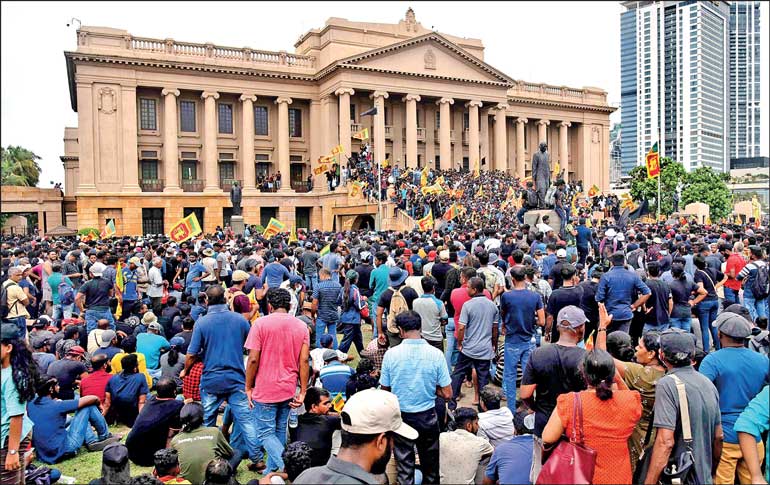Tuesday Feb 17, 2026
Tuesday Feb 17, 2026
Thursday, 14 July 2022 00:25 - - {{hitsCtrl.values.hits}}

RED-LETTER DAY FOR REPUBLICANISM – but beware the bloody excesses of the rebellion in the wrong hands
 Today, 14 July 2022, marks the 233rd anniversary of the Storming of the Bastille, which iconic event in 1789 triggered the French Revolution and the march towards a modern secular republic.
Today, 14 July 2022, marks the 233rd anniversary of the Storming of the Bastille, which iconic event in 1789 triggered the French Revolution and the march towards a modern secular republic.
It has also been five days since our own revolutionary event: the storming and subsequent occupation of the President’s Office; President’s House; and iconic Temple Trees, the official residence of the Prime Minister.
The similarities between the two events/movements offer us insights – as well as some cautions – into people’s revolts based on the often dangerous but certainly euphoric notion of ‘popular sovereignty’.
Similarities
The Storming of the Bastille was brought about by a plethora of socio-political evils in the France of its day.
For one, the King was an absolute tyrant – whose lavish lifestyle, together with the aristocracy, was to become unpalatable to the people.
For another, key officials appointed to reform the state of the polity and redress socio-economic imbalances were perceived to have been appointed by a cynical Monarch to perpetuate a status quo that favoured the Court rather than fought for the people’s lives and liberties.
Last not least, the abject penury suffered by the general populace had reached a breaking point – an injury compounded by the insult of the ignorance and apathy of the nobles to the ignominies borne by the hoi polloi for so long.
One suspects there is no need to labour the point about conditions in Sri Lanka leading to the crowd-led assault on precincts widely perceived to be bastions of iniquity. As well as symbols of authoritarianism that repeatedly turned tone-deaf ears to the plight of the people! Perhaps even deliberately caused the same for reasons of ego, arrogance, and not-so-enlightened self interest?
Insights
The Storming of the Bastille, like Sri Lanka’s own symbolic and active revolution, is a heady phenomenon that has heightened a sense of popular democracy but harbours hidden dangers for our polity too.
On the surface, it’s made the masses “intoxicated with liberty and enthusiasm” – as the journalist François Mignet observed of his fellow citizens on the original Bastille Day. Or as the poet Wordsworth wrote of the same landmark event: ‘Bliss it was in that dawn to be alive / to be young was very heaven!’ (The average age of the legionnaire at GGG is 37.)
But there’s the underlying danger that all revolutions tend to return, reinstate and reinvigorate the evils they were meant to critique, challenge and change.
For one, the French King had friends and loyalists among the Ancien Régime and old guard who fought a protracted rearguard action to defend the perks and privileges they had enjoyed under the Bourbon dynasty.
For another, the rabble – in the heady aftermath of ‘Bastille Day’ after it became apparent that there was more to justice than revolt, and much to be undone before the true Republic could be established – became dangerously and violently divided amongst themselves.
Human nature in a power vacuum can be an insidious spark. And ambition is a volatile tinder – as the brutal and bloody ‘Reign of Terror’ that followed proved.
And then again, there’s the role of the military in quelling riots. Which, in late 18th Century France, led to the rise of a young Corsican brigadier-general by the name of Buonaparte. Who was to become First Consul and then Emperor of France. Giving rise to yet another incarnation of despotism that took years of continental war and a Waterloo to depose.
Cautions
So as Sri Lanka ‘struggles’ à la the Aragalaya to consolidate victories won, it would do well for genuine liberty and peace-with-justice loving Sri Lankans to heed the warnings from even a foreign history. For the politically-minded heart is wicked above all things, and tremendously deceptive – especially to self.
On the one hand, there are the political opportunists of all stamps who even now look set to seize the moment. Their activities range from making self-serving statements about not stepping down from the highest executive office viable today – now that the chief has fled – until a caretaker government/interim cabinet is established; to endless rounds of horse-trading in the legislature, to jockey their favourites into pole position.
Against such, the Aragalaya has to contend while remaining steadfast in its purpose. Undaunted in its presence on the ground, and united in the face of divisive and subversive elements.
On the other, there are inflammatory agents provocateurs among the fiery socialists who would hold the state hostage and the people to ransom until a darker agenda is fulfilled. Only a few days ago, they emerged from the background and from behind the masks they had used to skulk around the environs of what was once the ‘Occupy Galle Face’ movement to claim – not for the first time – their ‘credit’ as ‘engineers of the revolution’ and their ‘rightful place’ as ‘architects of a new republic’.
To them we must say, as indeed the stalwarts of the Bar Association of Sri Lanka have already essayed: ‘Not by means other than the legal. But by constitutional modes and methods alone. And always via the properly accessed and channelled sovereign processes...”
These must for the sake of peace and the promise of future prosperity include such mechanisms as the vote. Fresh elections as soon as common decency and commonsense would allow. And the safeguarding of the traditional arms of government – selected executive, dissolved and re-elected legislature and transparently appointed judiciary – over and above spurious committees and councils.
The latter are often incorporated in the heat of the moment by cold, calculating hands on the battlefield of revolutions. Coolly counting on rash popular sentiment to rouse the people into a false move towards non-representative rule by petty dictators with small minds and no mandates to govern anyone at all.
We must not be gulled by them... nor equally, allow those antipathetic to the Aragalaya to lull us into a rage against the alleged excesses of the ‘Struggle’ by equating the violence of these elements with the passion of true protestors.
Last but by no means least, we must take practical steps by all means possible to avoid the jackboot of the military becoming the stamp of enforcing law and order. Or even permit a return to the ranks of the legislature any divisive figures who could ‘lead’ Sri Lanka but never ‘unite’ us all in a just new social contract.
We did not vote with our feet to rid ourselves of King Louis XVI and the Bourbon dynasty of our times in order to countenance the march of a Napoleon from exile in Elba back into the corridors of power.
And we must equally reject those who would say ‘I am the State’ as much as others that declare ‘None but Napoleon may crown Napoleon’.
| Editor-at-large of LMD | Rule by law alone |